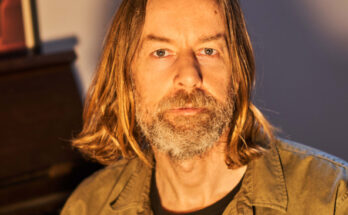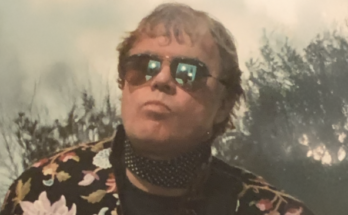 San Francisco-based singer-songwriter/pianist Claudia Combs Carty is set to release her debut album, Phases, on October 22, 2021. Nine tracks deep and written over the course of a decade, Phases is as personal as a series of confessional journal entries. Each heartbreak takes lyrical form, and every intimate confession is transformed into soaring notes, in a crescendo of self-discovery and an honesty that can only be revealed through time and a ready pen.
San Francisco-based singer-songwriter/pianist Claudia Combs Carty is set to release her debut album, Phases, on October 22, 2021. Nine tracks deep and written over the course of a decade, Phases is as personal as a series of confessional journal entries. Each heartbreak takes lyrical form, and every intimate confession is transformed into soaring notes, in a crescendo of self-discovery and an honesty that can only be revealed through time and a ready pen.
“These songs are just deeply a part of me,” says the 34-year-old Barcelona-born, Boston-raised artist. “It feels very therapeutic to be releasing them finally. Just like everybody else, I’ve been through some rough times. But you always come out of things. I am stronger from them. I am thankful for all of it. Falling in love all of those times made me know what I want and really defined me. It’s wild that this album is coming out now, because, for the first time in my life, I’m in a very solid place. It’s amazing to see myself from a perspective I did not have at the time.”
It was very important to Carty that this record sound natural, raw, almost live. “I wanted these songs to sound like the listener is in the room with me,” she says. “How I always play is sitting at the piano singing, so we didn’t want to embellish the songs too much.” Phases was recorded at Oakland, CA’s 25th Street Recording Studios. Carty’s sister, industry veteran Montserrat Carty, introduced her to a team that included producer Avi Vinocur, of the band Goodnight, Texas, whose songs have been heard in documentaries like “Tiger King” and “Free Solo,” and has a day job working with Metallica. During the session, Vinocur added guitar and vocal flourishes but also developed a deep connection to Carty and her work that made her comfortable with allowing someone else inside such a personal expression.
“He heard my music and believed in it, and I felt he understood me and my music in a unique way,” she says. “This album would not be anywhere as good without him. It’s terrifying when a collaborator doesn’t have the emotional attachment to it and says things like, ‘This word needs to change.’ But everything he suggested made sense. He’s a truly intelligent and talented musician.”
Although the album doesn’t come out until the fall, Carty already released her first two singles from it, the set-opening “Silent Whispers” and “All That,” earlier this year. “‘Silent Whispers,’” she explains, “is about anxiety. When I wrote that song, I was panicking, and I thought, ‘I’ll play piano.’ I literally made it up then, the words were coming out of my mouth, and I was like, ‘What is that?’ I didn’t know I felt these things.” “All That” was inspired by the end of a long relationship with someone Carty really loved. “But he was not right for me,” she says. “It’s about trying to move on, when the person really is still with you in a lot of ways, whether you like it or not.”
Several additional singles are planned for release before the album street date. “You Make Me Wanna Stay” will be released on August 13th, and a premiere is already planned at Glide Magazine. “Don’t Blame Me” is set for September 10th release. “Don’t Blame Me” is the first song Carty wrote. “It is so fundamentally me,” she says. “Everyone who knows me has heard that song at some point, and it’s a classic, at least in my life. It’s kind of funny, when you say, ‘Don’t blame me,’ when it kind of is your fault.” “Every Single Time” comes out October 8th.
Each song marks a timeline of relationship dramas, highs and lows, and those experiences have created a vulnerable showcase of piano and voice that is at once relatable and singular. Carty’s influences include songwriter Will Oldham, who performs as Bonnie “Prince” Billy, Stevie Nicks, and the late Jeff Buckley. Like those artists, Carty reveals her pain and uncertainty to produce something warm, sometimes uncomfortably relatable.
Carty has been expressing herself musically since childhood and ended up taking up piano after her mom asked, “What instrument do you want to play?” Her family took her response to that question seriously, buying their 7-year-old daughter a piano, “even though we didn’t have a lot of money,” Carty says. “It’s the most incredible thing anyone has ever done for me.” First came playing, and then singing, with classical compositions giving way to The Beatles and inspiring a passion for improvisation and expression. “My family always knew when something was happening with me, or when I was sad, because I’d be playing the piano,” Carty says. “The piano has been a teacher and therapist for me.”
After attending a performing arts high school, she decided to formalize her passion for music by studying at Boston’s storied Berklee College of Music, which was followed by a move to New York, where her first songs were conceived. It followed that she spent a short time in Austin before settling in the Bay Area. Despite urging from friends and family to record her songs, it took Carty a while to be in the right place, mentally and emotionally, to do so. When a boyfriend bought her the equipment she needed to record the album herself, “I didn’t use it once,” she recalls. “It was some blockage. I didn’t have love for myself. It took me a while to start dedicating my life to myself, a lot of therapy, and a lot of self-reflection. And once I got there, I was like, ‘Let’s get this recorded.’”
Exclusive Q&A about the song and her music
What prompted you to write this song? Is there a story behind it?
There’s always a story behind a love song! This was the first song I ever really wrote, after trying for years unsuccessfully, not really brave enough to like my own words. I moved to Brooklyn to get away from my life in Boston. A guy I was dating back home married another girl shortly after we’d broken up. I was 21 and felt like this was the saddest thing that would ever happen to me! Anyway, I’d been a terrible girlfriend to him, so he was happily married and I was regretful about that and wrote this song. I remember being alone in my room of a railroad apartment, and it all flowed out all at once. My best friend came over an hour later, and we recorded it with her slapping a hairbrush against her thigh for the percussion.
“Don’t Blame Me” seems to be deeply introspective in some ways, as some of the best songs are. Did you set out to write a song of this sort, or did it just happen that that was what happened in this song as it came together?
Thanks so much. I think at the time I didn’t know what I was up to. I just had a feeling and wrote about it, but it wasn’t initially for anyone but me and kind of a way of releasing my feelings and putting words to them. Once I started writing songs, I realized for me it was really about the release of emotion, and now, yes, it’s very intentionally introspective.
What can you tell us about the recording sessions and working on this song?
I can honestly say being in the studio the day we recorded this was the happiest day of my life. I had been holding myself back from fulfilling my dream of recording for so long, especially this song, because it’s been knocking around in my body for so many years. So, to be there, sitting at this incredible Steinway that I’m not even fancy enough to touch, in this heavenly huge room at 25th Street Recording Studios, it was a fantasy.
My producer and I had polished up four or five songs for recording there, but they were coming out perfect on the first try, so I just sat back down and played five more! Avi Vinocur, my producer, blew my mind that day, and thank goodness he was there because I was floating in the clouds and he was, like, pointing at a squiggle on the screen saying, “Right there, that note hit on the piano,” or, “I liked the way she did this verse in take two but the intro in take three.” He was sitting next to me in the room, and when I would finish the song and look at him, he was like two thumbs up and so excited. It was a really exciting day.
Your lyrics are rich and robust, with depth and plenty of catch-your-attention turns of phrase. Who are your biggest influences or artistic inspirations?
My lyrics are the thing I am probably most insecure about while writing. I get in my head about them being too basic, but they are really just how I talk and express myself normally, and I’m really going for honesty. I’m influenced more by my friends than anything else. Not that I’m anywhere close to as perfect with lyrics as he is, but my friend Stevie Weinstein-Foner writes the most beautiful lyrics, and they really inspire me. They make me think, “Hey, keep it natural,” and I like that kind of style. Whenever I’m listening to a certain band or artist a lot, I see it a little in my lyrics. Some examples of that have been Steven Merritt, Stevie Nicks, Jeff Buckley, Joni Mitchell, and Joan Armatrading. I wrote “Bridges Over Seas” after wearing out the record “I See a Darkness” by Bonnie “Prince” Billy.
Time to tell us a secret — what is something about this song that you haven’t mentioned anywhere else?
Yikes! Ok. I’ve had a lot of people ask me who this song is about. This one’s for you, Bobby!


